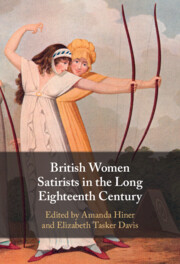Book contents
- British Women Satirists in the Long Eighteenth Century
- British Women Satirists in the Long Eighteenth Century
- Copyright page
- Dedication
- Contents
- Illustrations
- Notes on Contributors
- Acknowledgements
- Introduction
- Part I Traditions and Breaks
- Chapter 1 Women Writers and Juvenal
- Chapter 2 Unlocking the Dressing Room
- Chapter 3 Aphra Behn and Traditions of Satire
- Chapter 4 Delarivier Manley
- Chapter 5 The Pleasures of Satire in the Fables of Anne Finch
- Part II Publicity and Print Culture
- Part III Moral Debates and Satiric Dialogue
- Appendix Selected List of Eighteenth-Century Women Writers and Their Satiric Works
- Selected Bibliography and Guide to Further Reading
- Index
Chapter 1 - Women Writers and Juvenal
“Singing plain truths”
from Part I - Traditions and Breaks
Published online by Cambridge University Press: 31 March 2022
- British Women Satirists in the Long Eighteenth Century
- British Women Satirists in the Long Eighteenth Century
- Copyright page
- Dedication
- Contents
- Illustrations
- Notes on Contributors
- Acknowledgements
- Introduction
- Part I Traditions and Breaks
- Chapter 1 Women Writers and Juvenal
- Chapter 2 Unlocking the Dressing Room
- Chapter 3 Aphra Behn and Traditions of Satire
- Chapter 4 Delarivier Manley
- Chapter 5 The Pleasures of Satire in the Fables of Anne Finch
- Part II Publicity and Print Culture
- Part III Moral Debates and Satiric Dialogue
- Appendix Selected List of Eighteenth-Century Women Writers and Their Satiric Works
- Selected Bibliography and Guide to Further Reading
- Index
Summary
Juvenal was the satirist’s satirist, a writer whose output consisted only of poems in that genre. An uncompromising cataloguer of the crimes of Romans, Juvenal was also intensely masculine, his oeuvre implicitly addressed to men, with one satire (vi) devoted to the shameful derelictions of women (the source of much unimaginatively imitative misogyny during the Restoration). Juvenal’s obscenity, and the exclusion of women from classical learning, added to the sense that Juvenal was not suitable source material for aspirant women writers. This chapter, however, working from Penny Wilson’s sense of an “economy of makeshifts” in women’s engagement in classical literature, examines the cracks in that monolithic facade, starting with Juvenal’s own text, which contains an oddly sympathetic female satirist. Women did read Juvenal fairly extensively, albeit often in translation, and women writers did confront, adapt, and rework Juvenalian phrasing and attitudes in a wide range of forms – poetry, fiction, journalism, diaries. While there was no linear process of rapprochement between women writers and the foundational text of male satire, nor any single “female” mode of responding to that legacy, women writers found a surprising number of ways to absorb and transform it in their own satiric work.
Keywords
- Type
- Chapter
- Information
- British Women Satirists in the Long Eighteenth Century , pp. 27 - 44Publisher: Cambridge University PressPrint publication year: 2022
- 1
- Cited by

